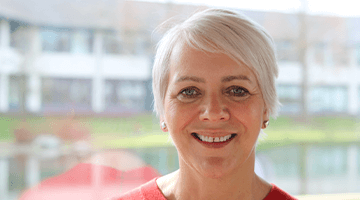Let’s all love our vote this week
Ahead of this week’s local elections, let’s each consider what we can do to support more people to vote. People like Barry and Barbara, neither of whom knew they were allowed to vote.
Research from Dimensions in 2021 showed that 27% of people did not know that everyone with a learning disability has the right to vote, whilst 80% found polling stations a difficult environment.

So, what can we all do to support and encourage more people with learning disabilities to have their democratic say?
Why to vote
Many people will need to understand why to vote before thinking about who to vote for, or how to vote.
Put simply, if you don’t vote, there’s no reason for government to listen to you. Political parties scrutinise voter turnout patterns after each election to work out who they need to be thinking about most in future. And that’s why groups that are less likely to vote – such as poorer, younger and disabled people – are often overlooked by government.
The only way to change that is by voting. By loving your vote.
If you’re supporting someone to think about elections and voting, you’ll find loads of information to help you on the Dimensions website here. Other organisations such as United Response also offer excellent resources here.
Who to vote for
You might have had leaflets coming through your door, or candidates knocking. But not every council is holding elections this year. The BBC has helpfully provided a guide here.
And we recommend the website ‘Who can I vote for’ which works to gather information about every single candidate. Give it a go!
For local elections, parties rarely publish easy-read manifestos.
Once you know who you can vote for, you can find them and their policies online through a quick Google search.Helping people understand those policies is empowering – and remember: it’s their vote, not yours. Stay impartial.
The journey to the polls
Many people we support have used our free voting passport that outlines your rights and lists any reasonable adjustments you may need on polling day to enable you to vote.
Voting should be fun and empowering. Many people we support have celebrated the opportunity to vote – including Dr Mark Brookes, who also became an electoral observer.
The future
If your loved one or the person you support isn’t registered to vote, they won’t be able to vote on Thursday. Don’t wait – support them to register now, ready for the next election.
I expect the Elections Bill, which passed into law on 28th April, to present more barriers to people exercising this right in the future, in the shape of a new requirement to present photographic id.
Once it is clear which ID is acceptable, we’ll be asking support teams to make sure the person they support is equipped to vote.
I think families, friends, advocacy and self-advocacy groups have a critical role to play here and at Dimensions, we’re beginning to think about how we can best offer support through these networks.
For now, click here to find out who you, your loved one or the person you support can vote for on Thursday.



